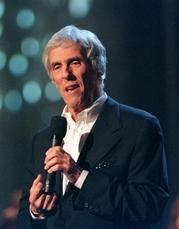What the Worlds Need Now ...

Back in the Swingin’ Sixties, the era that provided a parallel universe to the rebellious politically correct Sixties of war protest and the Sum
It will take too long to disabuse the world of the association with Austin Powers. It has been
The good news is that Burt is still here and still creating. Not only is he still creating but he has brought two parallel universes together again. He’s actually done it before with What the World Needs Now and Windows of the World, but this ti
The legendary, 77-year-old composer has found his voice in a politically charged album "At This Ti
"You could say, 'How does a guy who has written love songs his entire life suddenly decide to rock the boat?"' Bacharach says about the album that will be released internationally on October 24, with a
"I had to do it. This is very personal to me," he said of his first solo album in 15 years.
Challenged by his producer to take risks, Bacharach responded with songs set to hip-hop beats with lyrics, co-written with Tonio K., expressing nostalgia over bygone days and frustration with
Bacharach, an icon of swinging 1960s sophistication and winner of three
With young children, Oliver, 12, and Raleigh, 9, from his fourth marriage, and college-aged son Cristopher from his union with Sager on his mind, Bacharach said he was inspired to speak out.
"I thought that I had to speak lyrically this time as well as musically," he told Reuters, sitting in an easy chair in a
"As I wrote, I wrote musically. Then I started hearing words. These were things I heard, they grew out of the music," he said.
'STOP THE CLOCK'
Titles include the opening track, "Please Explain," that laments "Where is the love, where did it go;" the second cut, "Where Did It Go?" urges "Stop the clock, make it stop. Where is that world, where did it go?" and the most stridently political number, "Who Are These People?" sung by Costello.
That song, expressing disillusion
"Stuff just kept going more wrong and more wrong here as I was writing," explained Bacharach, still looking youthful in a blue sweat suit accentuating his bright blue eyes.
Bacharach, who projected an image of the
"I heard (then U.S. Secretary of State) Colin Powell tell the
"Then we go into
Bacharach branched out musically, writing film scores for "Butch Cassidy and the Sundance Kid" (1969), which had the hit "Raindrops Keep Fallin' on My Head," and the 1981 movie "Arthur" which also featured a hit song.
In recent years, Bacharach teamed up with other artists. His 1998 collaboration with Costello, "Painted From Memory," earned him a Grammy for "I Still Have That Other Girl." In 2003 he hit Billboard's top R&B/Hip-Hop album chart with an album he made of his songs sung by Ronald Isley.
In the new CD, Bacharach sings about his personal reflections on "Where Did It Go?"
"It's not like your normal, 'I am angry, I protest' song. There's a groove going on. It's kind of cookin' along on a nice groove. And I'm saying like 'Wow' in the middle, a little bit of a surprise for a statement I wanted to make. It became very heartfelt," said Bacharach, who said he cried doing the vocal.
"Who knows how this will be accepted or not accepted," he said. "Is it the best album I've ever done? Maybe.
"I hope it has the impact of making some people think and feel. Because I do believe a lot of music that's out there is like ear candy and you don't necessarily feel too much."

Comments